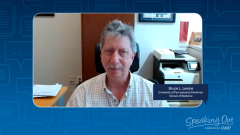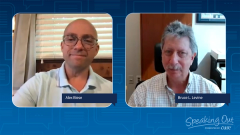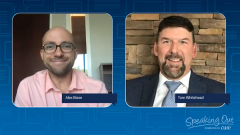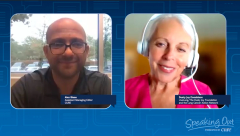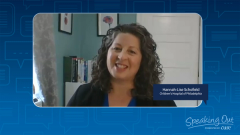
“Lung Cancer Is a Really Sneaky Beast”: Why patients need to remain vigilant with scans, even while dealing with “scanxiety.”
As part of its Speaking Out® video series, CURE® spoke with Dusty Joy Donaldson of LiveLung/The Dusty Joy Foundation and Lung Cancer Action Network about her lung cancer journey and the importance of scans.
Alex Biese: Hi, my name is Alex Biese. I'm the assistant managing editor of CURE® magazine. In this edition of the Speaking Out® video series, I'm speaking with Dusty Joy of LiveLung and the Lung Cancer Action Network, and we're discussing the importance of lung cancer scans and scanxiety. Dusty, thank you so much for joining me today. I really appreciate your time.
Dusty Joy Donaldson: Thank you for inviting me, Alex, it's my pleasure to talk about this. It's a topic that's very close to my heart.
Biese: Well, I really appreciate you sharing your time and your perspective with us and with our audience. So just to start off, for patients with lung cancer and survivors, why is it important that they remain vigilant with keeping up with their scans?
Donaldson: Well, it is important to remain vigilant because this lung cancer is a really a sneaky beast. And unfortunately, the sad fact is that lung cancer is the number one cancer killer, and it kills more people than breast cancer, prostate cancer and colorectal cancer combined. So we're dealing with a pretty mean monster here, if you will. So the more we can stay vigilant, we get the upper hand. Tomorrow, coincidentally will be my 18th year cancer-versary. And I'm here, and in excellent health, primarily because my cancer was caught early, I believe. So I was an early stage 1, 1B, and I had surgery and chemotherapy to cure me. So I'm fortunate and I want everyone else to be as fortunate as I have been.
Biese: And for folks who might not be aware of this issue. What does the term scanxiety refer to?
Donaldson: Well, it's kind of like anxiety on steroids. And it's surrounded around the time period when we get our scans. So, when we first get diagnosed with lung cancer, there are scans usually every three months. And then we kind of graduate to six months, and then we finally graduate to every year. And it's a little scary, kind of like walking off a ledge almost when you go for the first year without taking a peek inside. In fact, speaking of taking a peek inside, I remember when I was 10 years out and my oncologist said, "Listen, I think you're okay now. If you want to stop getting these annual scans, we can do that." And I said, "Are you kidding me? I would take a peek every day if I could, because I want to know what's going on on the inside."
So we do continue to do these scans, just now (they're) every year. But yeah, the scanxiety can really be crippling to people and frankly, early on I think it was worse for me (but) it's never gone away. Once you get a lung cancer diagnosis, it's almost like there's a black cloud over your head, but you learn to deal with it and there are things you can do to deal with it, but I think it's really important to stay on top of that and to continue to get your scans. I've known several people who stopped getting scans, only to be surprised later. We have a very high rate of recurrence with lung cancer, so staying on top of these scans is a way to catch it early.
Biese: What are some things that folks can do to cope with this in order to make sure they get to their appointment and make sure they keep up to date with their scans?
Donaldson: When you think about it, scanxiety is the anxiety about the scan. But really, if you look at it a little more closely, it's the anxiety about the cancer returning or growing. And like if somebody has test anxiety, it's not necessarily the test itself, but it's the fear of failure. If somebody's afraid of flying, they're really afraid of crashing, right? So, I think just understanding that, but there are things you can do.
For example, I like to plan something fun around that time, so you have something positive to look forward to. You could plan lunch with your girlfriends, or your guy friends, or an evening of poker or whatever is fun for you, even just an afternoon working in the garden, but plan something fun so you have something to look forward to, instead of dwelling on something potentially negative and kind of being crippled by that.
Another thing you might do is talk to your doctor about maybe some medication that might help you get over the hump. For me, even if I'm doing pretty well with no scanxiety, the minute I get that scan that's when it really sets in, and then my imagination runs wild. So I think I'm having a little aid, a medication, might be right for some people.
Another thing is, talk to your doctor about getting the results of that scan quickly. Frankly, in the early days, I had to wait sometimes a week or more to get the results of my scan, but I will give credit to the oncologists and radiologists who, really, they sense this scanxiety in their patients and they are doing much faster turnarounds on these reports, which I'm grateful for. And I hear that from a lot of patients too. In my case, it's the same day, so I don't have long to wait. Even so the scanxiety can be days or weeks before the scheduled scan. So whatever might work.
Another thing is to just maybe, to kind of take your mind off yourself, think about helping a neighbor or something, just doing something kind for somebody in need, volunteering or something like that. That also kind of helps when you see people who are maybe in a worse situation then you are. But there are a lot of different ways of coping, if you will. And I would suggest that you make a plan to do something.
Biese: And like you said, tomorrow is your 18 year cancer-versary. In your time of living in the oncology space, have you noticed a shifting or evolving attitude from care providers when it comes to the mental and emotional well-being of patients and survivors?
Donaldson: Yeah, I have seen a lot more sensitivity and care towards the patient's concerns, not just physical concerns. I mean, not just physical well-being but their psychological well-being (as well), and this scanxiety is definitely in the top of that. And again, it's not necessarily the fear of the scan, it's the fear of the cancer returning or growing. And so, I think the doctors are becoming responsive, and they're getting those scans read and the reports done in a much more timely manner than they did 15, 18 years ago. And so, that's really to their credit.
Biese: And tell me a bit about LiveLung, and for any of our viewers are not terribly aware, a bit about the organization and the work you all do helping patients with cancer and survivors?
Donaldson: Well, LiveLung was founded in 2010. So, we're going on 14 years now. And we have a network of educational patient groups for lung cancer patients and caregivers and we have a network of virtual and in-person meetings. So, we believe that there's empowerment in coming together and we have expert speakers to help give us information and knowledge that, again, will empower us to fight this battle with lung cancer.
Biese: That's fantastic. And so, you said your incidence of lung cancer was caught early, which is one of the reasons why you are in good health today. What are some of the potential long-term effects of both lung cancer and its treatments, even if it is detected early?
Donaldson: Well, long-term side effects of treatment for lung cancer, we're just really finding out about that now, aren't we? Because unfortunately, patients didn't live that long 20 years ago, it was almost unheard of to have lung cancer survivors (of) 20 years. And yet, you know, I know several who are living with lung cancer and/or a survivor. Some prefer one term, those who are in treatment usually prefer “living with cancer” and I'm totally respectful of that.
It's just that we all have to deal with long-term side effects. When we're living long-term, then we have these long-term side effects. And right now I'm, for example, dealing with hearing loss. And we're not sure if it's because of the chemotherapy that I had, there's no way to know for sure, but that is one of the risk factors. And so, I'm going to be fitted for hearing aid. And there are other things like neuropathy. So, these are things that patients are dealing with that, I guess it's (that) we're living, though, and so, I say we can't complain, but we just need to be cognizant of what are those long term side effects? And are there things that we can do to help mitigate those issues?
Biese: And that is a topic I'm also interested in, long-term side effects, long-term survivorship. But on the topic of scans and detection, is there anything else you would like our audience to know?
Donaldson: Well, I mean, I would just like to say that this fear of the uncertainty with the scan, I think one thing that would really give us peace of mind when we go into our scan is if we do have — I mean, some people, they're diagnosed and then the doctor just says, "Go home and get your affairs in order," and that's kind of brutal, and cold, I think. Nevertheless, I think that everyone ought to be getting their affairs in order. For example, have you made arrangements for your pet? Because that day will come for all of us. And have you made arrangements for your pets to be re-homed? Have you gotten your financial situation in order? Maybe there's life insurance that you can cash in on now. I mean, there are a lot of things that we can do and prepare for, whether it's 18 years down the road, or 18 months. So, I would just like to encourage people, one way to alleviate the scanxiety is to have peace of mind when you go in for your scan by having these things taken care of.
Biese: That makes a lot of sense. Well, Dusty, thank you so much for your time today. I so appreciate this conversation. I hope you have a great day.
Transcription edited for clarity and conciseness.
For more news on cancer updates, research and education, don’t forget to

